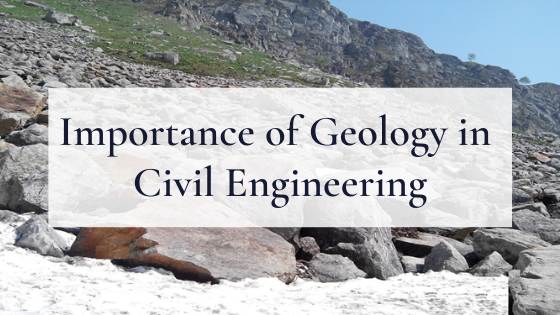Specialized Geotechnical Engineering Solutions Can Be Fun For Everyone
Specialized Geotechnical Engineering Solutions Can Be Fun For Everyone
Blog Article
Getting The Specialized Geotechnical Engineering Solutions To Work
Table of ContentsA Biased View of Specialized Geotechnical Engineering SolutionsWhat Does Specialized Geotechnical Engineering Solutions Mean?Fascination About Specialized Geotechnical Engineering SolutionsSpecialized Geotechnical Engineering Solutions Fundamentals Explained
They conduct site investigations, collect samples, carry out lab tests, and examine information to examine the viability of the ground for building and construction tasks. Based upon their searchings for, geotechnical designers provide suggestions for structure style, incline stability, keeping structures, and mitigation of geotechnical hazards. They collaborate with various other specialists, such as engineers, architectural designers, and building teams, to ensure that geotechnical considerations are incorporated right into the general project design and execution.
Structure Style: Geotechnical engineers play an important function in creating foundations that can safely support the desired framework. They examine the soil conditions and load needs to establish the proper structure type, such as shallow structures (e.g., grounds), deep foundations (e.g., piles), or specialized strategies like dirt improvement. They consider factors such as negotiation limitations, bearing ability, and soil-structure communication to establish optimal structure styles.
The Only Guide to Specialized Geotechnical Engineering Solutions
Right here are some kinds of geotechnical engineers: Structure Designer: Foundation engineers concentrate on designing and assessing foundations for frameworks - Specialized Geotechnical Engineering Solutions. They assess the dirt problems, load demands, and website qualities to establish the most proper structure type and style, such as superficial structures, deep foundations, or specialized methods like stack structures
They perform field screening, accumulate samples, and examine the accumulated data to define the dirt homes, geologic developments, and groundwater conditions at a site. Geotechnical Instrumentation Engineer: Geotechnical instrumentation designers concentrate on monitoring and determining the actions of dirt, rock, and structures. They set up and keep instrumentation systems that monitor elements such as soil negotiation, groundwater degrees, incline activities, and structural displacements to evaluate performance and supply very early cautions of possible concerns.
In the workplace setting, geotechnical designers utilize specialized software application devices to do estimations, develop layouts, and assess information. Specialized Geotechnical Engineering Solutions. They prepare records, testimonial task requirements, connect with customers and employee, and coordinate job activities. The office setting provides a conducive environment for research, evaluation, and cooperation with various other experts included in the job
They often go to project sites to perform website examinations, examine geotechnical conditions, and gather information for analysis. These check outs include traveling to various areas, often in remote or difficult terrains. Geotechnical designers might carry out soil tasting, conduct examinations, and monitor construction tasks to make sure that the geotechnical elements of the project are being applied appropriately.
The Buzz on Specialized Geotechnical Engineering Solutions
Geotechnical designers additionally work in specialized geotechnical laboratories. In these facilities, they conduct experiments, execute examinations on dirt and rock samples, and evaluate the engineering residential or commercial properties of the products. Geotechnical laboratory engineers function extensively in these atmospheres, taking care of testing devices, running tools, and recording information. They collaborate with other research laboratory staff to make sure exact and dependable screening outcomes.
Preserving Wall surfaces: Creating walls that hold back soil to stop landslides and give security on sloped surfaces. Embankments and Earthworks: Creating embankments for roadways, trains, and dams to guarantee they continue to be secure under stress. The mining industry relies heavily on geotechnical engineering to guarantee the security and durability of its operations.
With this in mind, we have designed our program to prepare pupils for success. Geotechnical engineers are entailed in all stages of the layout of structures, from principle to building. Their work is necessary in the design and preparation process as they examine the honesty of dirt, clay, silt, sand, and rock, prior to building starting.
5 Easy Facts About Specialized Geotechnical Engineering Solutions Described
This is adhered to by a ground examination based upon the searchings for of the workdesk study and involves trial pitting and sampling to uncover any potential problems. Geotechnical engineers work within multidisciplinary teams, supported by intermediate and junior engineers as well as by CAD service technicians. As an elderly geotechnical designer on a hydro plant job, jobs may include taking part in technological reviews (e.g., peer evaluations), tailings clog examinations, dam safety evaluations, and other research studies connected to the design and building of mine waste facilities.
While some experts specialise solely in geotechnics, others might function under titles like engineering geologist or reference ground designer within comparable capacities. As a geotechnical engineer, you'll require to: develop and maintain relationships with customers and various other professionals associated with the website, throughout each projectmaintain safety and security requirements on site be conscious of expense implications when you make recommendationsstudy geological maps and aerial pictures from a series of sources and from various time periodsexamine building top article plans to see just how practical they are based on your understanding of the siteinvestigate threats or geological risks for the sitesearch for environmentally delicate features, such as land fill begin to develop accurate and interpretive ground modelsplan area investigationsdrill and analyse examples of bedrock, soil, groundwater and added materials manage other specialists on sitesolve technical concerns as they occur, such as unanticipated structures at drill sitesmonitor problems during and after building and construction to make certain frameworks are stable in the brief and long termadd information accumulated on site to your first researchcreate geotechnical computations, illustrations, and two or three-dimensional computer versions translating the datamake referrals about the suggested usage of the site.
There are great deals of opportunities to satisfy brand-new people, as you'll deal with a series of specialists at every website. visit The work can be difficult as you might be accountable for the security of others while on website. There is likewise a high level of monetary responsibility, as the recommendations you make can have significant cost ramifications.

Report this page